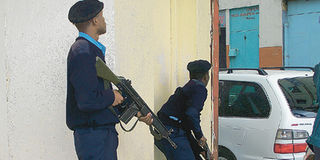Police and councils still top bribery list

Bribery in the police force has been attributed to poor pay of officers. Photo/FILE
The Kenya Police still remains Kenya’s most corrupt institution, albeit with considerably lower levels of graft than in previous years.
The latest findings of a Consumer Insight report show that the police force and local authorities remain the two most corrupt institutions in the past three years.
In the latest survey covering the past 12 months, the police scored 37 per cent followed closely by the City, county and municipal councils across the country with a score of 16 per cent.
Topped list
Compared to the previous two years, this year’s corruption incidence in the two institutions has gone down.
In 2007, the police force and local authorities topped the list of most corrupt institutions with a score of 43 per cent and 22 per cent respectively.
In 2006, they scored 47 per cent and 24 per cent respectively, indicating a gradual reduction in the frequency of bribery cases in these institutions.
The Consumer Insight report findings come just five months after another report by Transparency International ranked the police in Kenya as the 11th most corrupt institution.
Among others, bribery in the police force has been attributed to poor pay of officers.
Police officers have been accused of exploiting the fear of arrest and violence in their victims, who prefer to part with a bribe rather than face the prospect of any time behind bars.
TI warned that rampant police corruption threatened to make it socially acceptable to use alternative systems of justice such as illegally armed groups, vigilantes and mob violence.
Coming third after the two institutions are “other organisations’ not specified by the report, with a score of six per cent.
Also on the Consumer Insight bribery index are private companies with a five per cent score and the judiciary with four per cent.
Like the Kenya police, the judiciary in Kenya has also fared badly in corruption reports and equally faced repeated calls for reforms.
Public hospitals, public schools, the Immigration Department, the Ministry of Labour, and other Government ministries have not been spared on the corruption index, having been ranked with a score of three per cent each.
They are followed by the Kenya Revenue Authority, the Department of Defence and the Provincial Administration, all recording a score of two per cent.
The report has given a majority of institutions a low ranking of one per cent on the bribery index.
Falling under this group are state corporations, public and private universities, the Teachers Service Commission, the Ministry of Public Works, private schools, Parliament and the National Social Security Fund.
Low score
The most improved among these low bribery incidence institutions are state corporations, which recorded a three per cent score in 2006 and 2007.
The Kenya Revenue Authority has also recorded commendable improvement, according to the survey, having posted a score of five per cent in the previous two years.
Public and private universities have maintained a low score of between one and two per cent over the last three years according to the latest survey in which 5,000 people were interviewed.




